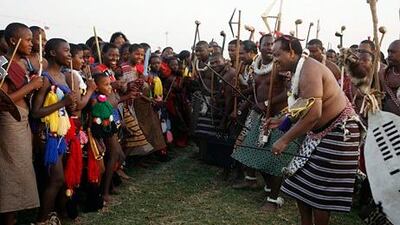The first person to stand me lunch as a reporter was a Chinese commercial attaché.
It was Swaziland and 1993.
My first week on the national newspaper of the tiny African kingdom had taken in a roadside fist fight between two rival evangelical congregations, lots of cattle rustling and a drugs case in which the defendant had argued, unsuccessfully, that the ample quantity of marijuana found in his possession was for medicinal use - for his donkey.
It was a tabloid journalist's dream. It was a business journalist's nightmare.
Nothing of commercial interest seemed to cross the business desk of the Times of Swaziland of which I was sole reporter, editor, photographer and occasional picture developer - fumbling blindly in the dark room on deadline when the photo editor had come down with another nasty and recurring dose of absenteeism.
In the late evening, yawning paste-up ladies arrived to sit in silent rows at the back of the sweltering news room, where rattling fans democratically distributed passive cigarette smoke for the benefit of all.
Dead-eyed assassins of the written word, they edited copy using big pairs of scissors you could cut an Axminster carpet with. If the column they had to glue on to the page was too long, they would simply snip off the end, mid-sentence, to make it fit.
On the rare occasion that news from the tiny kingdom made it into the international press, it was invariably a story about HIV, then affecting about one in four of the adult population, or the annual reed dance, when the king would inspect a mass gathering of the country's "maidens" and sometimes pick one as a wife.
It seemed hard to imagine this pineapple and paper pulp exporting sub-Saharan outpost attracting the interest of many international investors - much less figuring in the corridors of power in Beijing.
Of course the country had commodities. But the sort you might find as toppings on a Hawaiian pizza, or in the box that was used to transport it.
They didn't have many of the really good ones used to power industrialised economies and create vast current account surpluses.
Still, 20 years ago the Chinese were already established in a whole range of agricultural-based knowledge transfer projects in Swaziland and many other countries up and down the continent besides.
There never seemed to be much of an agenda during those lazy lunches all those years ago in that Chinese restaurant in Mbabane, the capital.
We would while away the hours with our jolly banter about agricultural knowledge transfer and the footie. It was a soy-flavoured marriage of journalistic convenience. My Chinese host didn't seem to have any other reporters to take to lunch and I didn't have anyone else willing to buy me lunch.
The Chinese have been playing the long game in Africa for decades. Now Japan wants to join the race to secure the commodity feedstocks that it is hoped will propel the world's third-largest economy out of years of stagflation and economic marginalisation.
But there is something of the hare and tortoise parable in this contest between Asia's two great economic powerhouses.
This month the Japanese prime minister Shinzo Abe pledged about US$32 billion to Africa over the next five years, raising the stakes in its intensifying competition with Beijing.
It seems a massive sum, but not when you compare it with the $138.6bn in annual trade between China and Africa - or about five times the value of Japanese trade with the continent. There is clearly a lot of ground to be made up, some pacing to be done and many lunches to be bought if the Japanese hare is not to run out of puff somewhere between Cape Town and Algiers.
They say that there is no such thing as a free lunch. But in Swaziland in 1993, there was - as long as you liked Chinese food. The Japanese, playing 20-year catch-up, may find sushi proves more of an acquired taste in Africa.
scronin@thenational.ae

Japan has a lot of ground to make up on Chinese in Africa
The Japanese are not going to find it easy to catch up with the Chinese in Africa. They say there's no such thing as a free lunch, but there was in Swaziland in 1993 as our reporter found out as long as you liked Chinese food.
Most popular today
